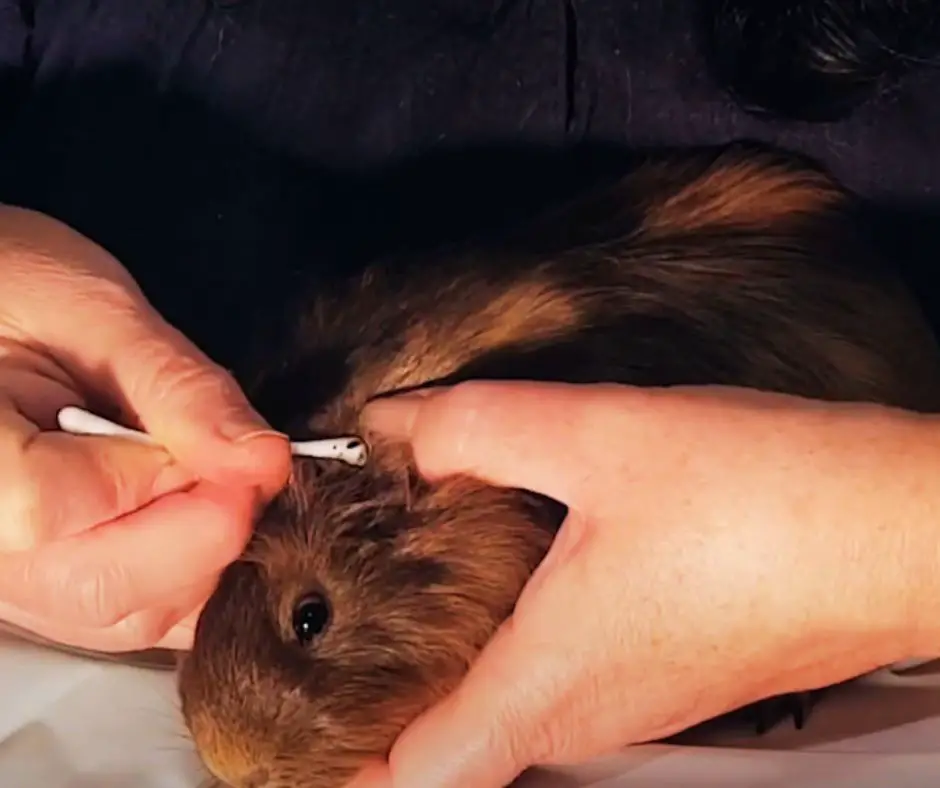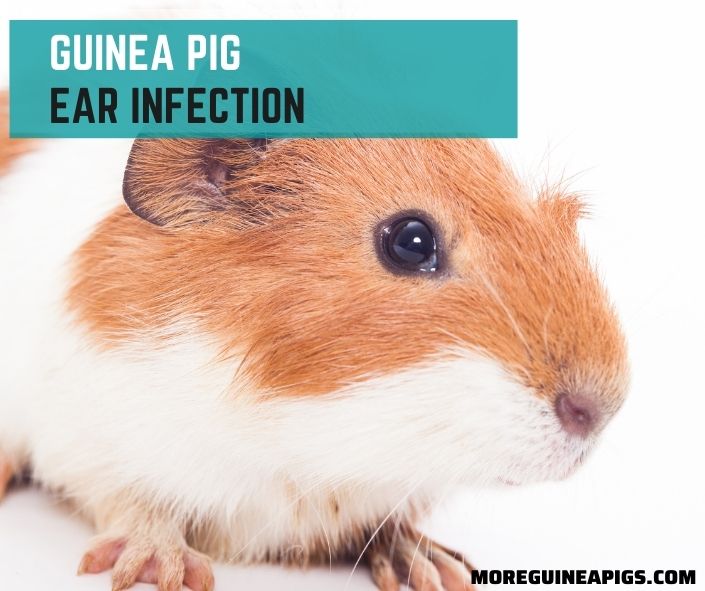Guinea Pig Ear Infection: Signs, Cause, and Treatment
Guinea pigs are prone to a variety of health issues, one of which being bacterial ear infections. As a result, it is vital to avoid and provide guinea pigs with the best possible care, such as preventive care and therapy.
It’s clear that pet parents are concerned about the health of their cherished pets. This article will teach you everything you need to know about guinea pig ear infections, including the causes, symptoms, and treatment options.
How Do You Know If Your Guinea Pig Has Ear Infection?

Guinea pigs rarely get ear infections, but they can get them if they’re exposed to bacterial contamination.
A Guinea pig’s outer ear pinna, auditory canal, middle ear, and inner ear can all become infected. A guinea pig that has been sick appears dull, lethargic, has difficulty walking, and tilts its head to one side.
Bacteria are almost always the cause of guinea pig ear infections. They can also be caused by fungi. They multiply in the ear canal, resulting in the production of foul pus.
The guinea pig ear gets pus and a yellowish viscous substance is discharged from it. The pus discharge has a nasty odor that irritates both the guinea pig and the owner.
The guinea pig’s sense of hearing may be lost if the infection is not treated.
Treatment varies according to the condition and severity of the infection, however, ointments, anti-inflammatory ear drops, and antibiotic ear drops are commonly prescribed by veterinarians.
However, it is preferable to get guidance from a veterinarian.
Guinea Pig Ear Infection Symptoms
The signs of mild ear infection include ear pain, rubbing of the ear, and being lethargic due to difficulty in hearing.
If not treated promptly, the infection might spread to other areas of the ear. The signs of severe ear infection include pus discharge from the ear, red or swollen ear pinna, deafness, loss of appetite, loss of body balance, and walking in circles.
These symptoms are indicative of a guinea pig ear infection; however, they cannot be used to diagnose the origin of infection.
When guinea pigs have an ear infection, veterinarians may prescribe respiratory medications. This should not be confused with guinea pig ear infections, because they are also caused by severe pulmonary inflammation.
Also read: What Does It Mean When Guinea Pig Nodding Head?
Why Do Guinea Pigs Get Ear Infections?

Guinea pig ear infections can be caused by bacteria, parasites, and respiratory infections. The guinea pig ear mite Psoroptes cuniculi produces an infestation in the external ear.
Guinea pigs acquire this parasite through sick cage mates or rabbits, and it is visible to the naked eye.
The dirty and contaminated cage liter contains bacteria like Bordetella and Streptococcus. When these bacteria invade the inner ear, they can cause ear infections.
They can also infect the respiratory tract, which can lead to infection.
Because the central nervous system provides a common nerve supply to the eyes, ears, and respiratory tract. When the guinea pig’s lungs become infected, the guinea pig’s inner ear is also affected.
Diagnosis Guinea Pig Ear Infection
The signs and symptoms of guinea pig ear infections can be easily identified. A veterinarian, on the other hand, will inspect and test the pet thoroughly to determine the sort of infection.
A veterinarian will use a bacterial culture or a blood test to determine the source of the infection.
The pus/fluid discharge from the guinea pig ear can readily be used to diagnose bacterial infections. Blood samples and ear examinations can be used to identify and confirm mite infections. As a result, correct identification of infection aids in therapy.
Prognosis Expected Outcome of Ear Infection

The severity of the ear infection determines the prognosis. Guinea pigs, on the other hand, usually recover from ear infections.
Otitis externa, otitis media, and otitis interna are the three forms of ear infections. Otitis externa is an inflammation of the external ear, including the pinna, that guinea pigs can recover from without complications.
Otitis media is an inflammation of the middle ear, including the auditory canal, that guinea pigs recover from with the help of prescription medications.
The end of the eardrum connects the guinea pig ears to the neurological system. Otitis interna is an inflammation of the inner ear that includes the eardrum.
It becomes difficult for a veterinarian to control an infection after it has gone to the eardrum. The inner ear provides an ideal habitat for germs to thrive.
The bacteria in the inner ear have an effect on the neurological system’s ear nerve endings. This causes further complications such as permanent deafness, loss of balance, tilted head, and walking in circles.
How to Treat an Ear Infection in Guinea Pigs?

Ear infections in Guinea pigs can be treated using veterinary-prescribed ointments and ear drops.
Antibiotic ointments are prescribed by veterinarians for infections or inflammation of the external ear. Guinea pigs with a middle or inner ear infection are given antibiotic ear drops.
Veterinarians recommend local anesthetic medications like lignocaine to treat pain in guinea pigs suffering from severe pain.
Inflammation is also controlled by anti-inflammatory and antihistamine medications. Along with these medicines vets recommend washing the ears with antiseptic or antibiotic solutions.
Guinea Pig Ear Infection Home Remedies
It is possible to use home remedies to treat guinea pig ear infections. Applying specific oils to the external ear might also help to reduce and prevent both inflammatory reactions and infections.
However, you should see a veterinarian, who will prescribe antibiotic drops and solutions to use.
How Do Vets Treat Ear Infections?
Antibiotic drops, anti-inflammatory medicines, ointments, antiseptic solutions, and local anesthetic agents are all used by veterinarians to treat guinea pig ear infections. The use of these medications is determined by the infection’s condition and severity.
The vet will prescribe drugs to treat a guinea pig ear infection caused by a respiratory condition such as pneumonia. The secondary infection (ear infection) can easily be treated once its root cause (respiratory infections) is removed.
AMBER NATURALZ – Ear Care – Herbal Ear drops – for pets, 1 ounce
What Happens If Ear Infection Untreated?
If an ear infection in a guinea pig is not treated, it can lead to deafness, difficulties walking, a permanently tilted head, confusion, and nervous disorders.
Bacteriostatic or bactericidal medications are used to control and prevent bacterial proliferation in the inner ear.
If bacteria and mites have unrestricted access to the ear, they can cause damage to the nervous system. Through the eardrum, bacteria can infect the nerves in the skull.
The guinea pig will start scratching the ears aggressively due to pain. It becomes difficult to recover from a severe infection if it is left untreated.
How to Prevent Guinea Pig Ear Infection?

Ear infections in guinea pigs can be prevented. Bacterial infections are caused by an unsanitary cage or housing conditions.
Cleaning the cage and changing the litter on a regular basis will help to prevent ear infections. Litter provides an ideal environment for bacteria and mites to thrive. These germs can attach to the guinea pig ears and multiply, causing infections.
Guinea pig ear infections can also spread from one pig to another if they come into touch. You should regularly disinfect the cages and keep infected guinea pigs in separate cages.
Ear infections can also be avoided with regular grooming and a well-balanced diet. To prevent microbial and parasite growth, make sure the guinea pig cages are sufficiently ventilated and moisture-free.
Also read:
- How To Clean a Guinea Pig Cage?
- How To Bathe a Guinea Pig?
- 10 Best Guinea Pigs Commercial Food
- Is It Normal If Guinea Pigs Have Bald Spot Behind Ears?
Gentle Cleansing Ear Wash Solution Mite Infection & Yeast Treatment for Pets
Conclusion:
Guinea pigs rarely suffer ear infections, although bacteria can enter the ear canal and cause infection. Ear infections can also be caused by serious respiratory infections like pneumonia.
The common bacterial ear infections are otitis interna, otitis media, and otitis externa. Otitis media and Interna are serious conditions that require quick attention.
When the eardrum is infected, the guinea pig loses his or her equilibrium and begins walking in circles. Depending on the severity of the infection, veterinarians can prescribe ointments, antibiotic drops, and pain relievers.
It is necessary to take precautionary measures to prevent ear infections. If your guinea pig becomes infected, get emergency medical attention from a veterinarian.
Also read: 8 Disorders and Diseases of Guinea Pigs








